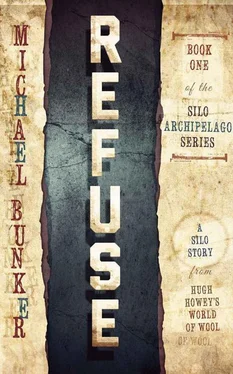Leah growled and threw a plastic container at him, but he ducked and the container bounced harmlessly among the sacks stacked behind him. He winked at her again and went back to sorting.
They flirted a lot, but nothing much had ever come of it. She’d known Ivan for most of her life, and she liked him well enough. He was handsome in a mids kind of way, and she probably would respond if he ever showed any real interest, but both of them were too wrapped up in their world of making paper—and writing—to expend too much energy in the pursuit of romance. She was happy with the way things were, and she didn’t want to lose Ivan as a friend. Or maybe I just tell myself that because Ivan has never done anything other than flirt with me.
* * *
When the shift was over, the pickers stacked their bins in the packing area. Overnight, packers would come into the section and bundle the salvaged material for delivery by the porters to the different areas of the silo that engaged in manufacturing new things from the salvaged materials. A lot of this refuse—the paper waste—would go to the official paper manufacturing section, where it would be pulped and bleached and made into new paper. Then it would be cataloged and traced and tracked and used for approved purposes only.
You could get paper for your family if you had enough chits, and as long as you weren’t a trouble maker. You could draw and paint—even write— if (and only if) whatever you drew, painted, or wrote was acceptable and was in conformity to the laws of the silo. It had to be pre-approved. As a result, almost no one wrote books, other than the handful of officially sanctioned writers who wrote lukewarm, un-challenging tripe for the widest possible audience. There was no room in the literature of the silo for metaphor, or irony, or for a bracing, cold waltz with the truth.
Ivan reminded her again that he was really hoping she was going to make it tonight. She assured him once again that she intended to be there. Then they just talked, because that is what friends do. Unfeigned and unguarded friendship leads to pure conversation, and she often experienced this kind of fellowship with Ivan.
As they spoke, she absentmindedly pressed her hand up against the almost imperceptible lump in her coveralls where she’d stuffed the shredded paper. From some motivation that she deemed to be almost base and prurient, she felt an extreme amount of excitement and pleasure from the idea (and the act) of stealing raw materials to make homemade paper. She’d often tried to quantify the feeling. She’d analyzed it (or attempted to) and tried to make a judgment from that analysis about what her illegal activities had to say about her character. She’d even hoped to feel guilty about it, because feeling guilty might mean that she still had a place in the social structures of the world around her, and that she hadn’t utterly forsaken the society of the silo in pursuit of her own selfish ambitions. If she could feel guilty, then that would mean that she was still one of them . Nevertheless, in her innermost thoughts, she could find no home for self-recrimination. She knew that in her conscience, she’d already determined that it was the silo’s laws and culture that were criminal, and that her desire to write may be against the letter of the law, but it was not against any higher law that she could possibly imagine.
A subtle smile crept across her face as she embraced the feeling that the cocktail of adrenaline and whatever other self-manufactured chemicals gave her as it thrummed through her veins whenever she stole the raw materials for making paper. She was a junkie and she knew it.
She only enjoyed her feeling of euphoria for a moment though, and the smile quickly melted from her face when she glanced up and saw Joseph Kind staring at her with a look of what she could only interpret as confident malevolence. The high she’d just been on drained from her in microseconds, and at once she was overwhelmed with the feeling that all was lost. Joseph Kind was a picker, but he was definitely one of them . Maybe she was wrong about Joseph. She’d been wrong about people before. But she could not deny the way Joseph’s look made her feel.
He can’t know that I’ve stolen paper today… can he?
The six criminals chewed in silence. They were co-conspirators in the grand drama of revolutionary enterprise, and the silence gave weight to the proceedings. Most of the time, the room was basked in the weird ambiance of breathing and chewing and not much else. Chewing. That’s the way that paper is pulped in the underground. It is chewed, like the cud of the ruminants on the agricultural floors. From the word “ruminant” we get our word “ruminate”:
Ruminate: to go over in the mind repeatedly. To engage in contemplation.
Alexander taught them how to make paper this way. He said that prisoners throughout antiquity—in the other world, and in this one—had made black-market paper in this fashion. Once, he told them the story about prisoners during a great world war that chewed stolen bits of paper to make new paper for escape maps and notes that could be smuggled out to the underground resistance.
So the six guild friends chewed away like prisoner-revolutionaries manufacturing the means of their own escape. They each chewed and spit in indeterminate intervals. The skill was a learned one. It took time and experience to know just when the fibers were broken up enough and separated sufficiently so that they’d produce good paper. You had to learn not to think about where the paper had been, or how many thousands of times it had been recycled before.
In previous iterations perhaps dog hair or goat hair, or shreds of old garments and fragments of materials now unknown and lost in the mists of time might have been added to the eternal mix.
The source material could be derived from just about any old natural paper product: tissues, computer paper, cardboard boxes, wrapping paper, manila folders, notepaper, chit reports, or even envelopes. The source paper was always shredded first. Usually by hand. This is why pre-shredded paper stolen from the reclamation bags was such a great find. The bulk material, shredded into small bits, was then soaked overnight in buckets of water so that it could be chewed and pulped more easily.
Small metal frames had been fashioned laboriously from the heavy twists of wire used to seal the reclamation bags. The frames held fast the sections of tight wire mesh screening that had been purchased in the underground black-market, probably copped from the farming floors, or maybe from a willing black-market opportunist in Supply.
The pulp, when properly chewed to the right consistency, was then spit out onto the frames, spread to the appropriate thickness, and then dried for a day in the frames. When dried sufficiently, it would then be carefully (Oh, so carefully!) peeled from the frames and hung with clothespins to cure for another week. This process produced a very basic, coarse, and sometimes brittle paper. If the paper was intended for use for their own writing, they only cured the paper for five or six hours, then it would be pressed between two heavy objects, or, preferably in their makeshift paper press. The pressing would remove most of the ridges and valleys so that the charcoal could move more freely across the paper.
Alexander often talked of more advanced and involved papermaking processes. In the past, some of those processes were used by black-market paper guilds in the silo. But, the more intricate the process, the more things could go wrong, and the more likely it was that someone in authority would find out, and the guild would be busted.
Читать дальше












